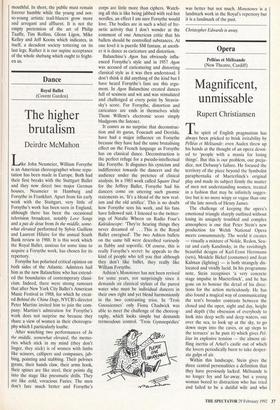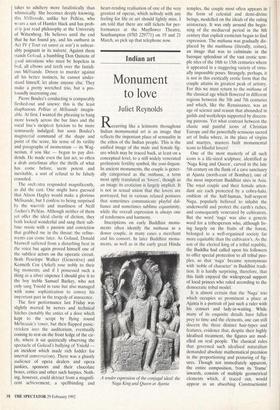Opera
Magnificent, unmissable
Rupert Christiansen
The spirit of English pragmatism has always been pricked to brisk irritability by Pelleas et Melisande: even Auden threw up his hands at the thought of an opera devot- ed to 'people with a mania for losing things'. But this is our problem, our preju- dice, not Debussy's failure. He focused the territory of the piece beyond the Symbolist paraphernalia of Maeterlinck's original play and made its subject firmly the matter of men not understanding women, treated in a fashion that may be infinitely sugges- tive but is no more wispy or vague than one of the late novels of Henry James.
The challenge of keeping the opera's emotional triangle sharply outlined without losing its uniquely troubled and complex atmosphere is one that Peter Stein's new production for Welsh National Opera meets consummately. The world it creates — visually a mixture of Nolde, Redon, Seu- rat and early Kandinsky, in the ravishingly beautiful designs of Karl-Ernst Herrmann (sets), Moidele Bickel (costumes) and Jean Kalman (lighting) — is both strangely dis- located and vividly lucid. In his programme note, Stein recognises 'a very concrete stage impulse in Maeterlinck', and he has gone on to honour the detail of his direc- tions for the action meticulously. He has also found a magical way of communicating the text's broader contrasts between the closed and the open, night and day, height and depth ('the obsession of everybody to look into deep wells and deep waters, out over the sea, to look up at the sky, to go down steps into the caves, or up steps to the terraces' as he puts it) which gives Pel- leas its explosive tension — the almost sti- fling inertia of Arkel's castle out of which the lovers periodically burst to take desper- ate gulps of air.
Within this landscape, Stein gives the three central personalities a definition that they have previously lacked. Melisande is no longer fey and far-away, but a young woman bored to distraction who has tried and failed to be a dutiful wife and who takes to adultery more fatalistically than whimsically. She becomes deeply knowing, this Melisande, unlike her Pefleas, who wears a suit of Hamlet black and has prob- ably just read philosophy at the University of Wittenberg. He believes until the end that he has found joy, and his outburst in Act IV ('Tout est sauve ce soir') is unbear- ably poignant in its naïveté. Against them stands Golaud, a bumbling Don Quixote of good intentions who must be hopeless in bed, all elbows and teeth over the fastidi- ous Milisande. Driven to murder against all his better instincts, he cannot under- stand himself, let alone anyone else. They make a pretty wretched trio, but a pro- foundly interesting one.
Pierre Boulez's conducting is comparably fleshed-out and sinewy: this is the least diaphanous PeIleas et Melisande imagin- able. At first, I wanted the phrasing to hang more loosely across the bar lines and the vocal line's incipient lyricism to be more sensuously indulged: but soon Boulez's magisterial command of the shape and point of the score, his sense of its virility and paragraphs of momentum — its Wag- nerism, if you like — began to pay divi- dends. lie made even the last act, so often a drab anticlimax after the thrills of what has come before, seem potent and inevitable, a sort of refusal to be falsely consoled.
The orchestra responded magnificently, as did the cast. One might have guessed that Alison Hagley would make a glorious Melisande, but I confess to being surprised by the warmth and manliness of Neill Archer's Pefleas. Although neither of them yet offer the ideal clarity of diction, they both looked wonderful and sang their sub- lime music with a passion and conviction that grabbed me in the throat: the refine- ments can come later. As Golaud, Donald Maxwell suffered from a disturbing beat in the voice but again proved himself one of the subtlest actors on the operatic circuit. Both Penelope Walker (Genevieve) and Kenneth Cox (Arkel) rose nobly to their big moments; and if I possessed such a thing as a silver sixpence I should give it to the boy treble Samuel Burkey, who not only sang Yniold in tune but also managed with some sophistication to convey his important part in the tragedy of innocence.
The first performance last Friday was slightly marred by nerves and technical hitches (notably the antics of a dove which kept to the script by flying round Melisande's tower, but then flapped panic- stricken into the auditorium, eventually coming to rest on the front ledge of the cir- cle, where it sat quizzically observing the spectacle of Golaud's bullying of Yniold — an incident which made rich fodder for interval conversation). There was a ghastly audience of opera dealers and opera junkies, sponsors and their chocolate boxes, critics and other such harpies. Noth- ing, however, could detract from a magnifi- cent achievement, a spellbinding and heart-rending realisation of one of the very greatest of operas, which nobody with any feeling for life or art should lightly miss. I am told that there are still tickets for per- formances at the Mayflower Theatre, Southampton (0703 229771) on 19 and 21 March, so pick up that telephone now.



















































 Previous page
Previous page